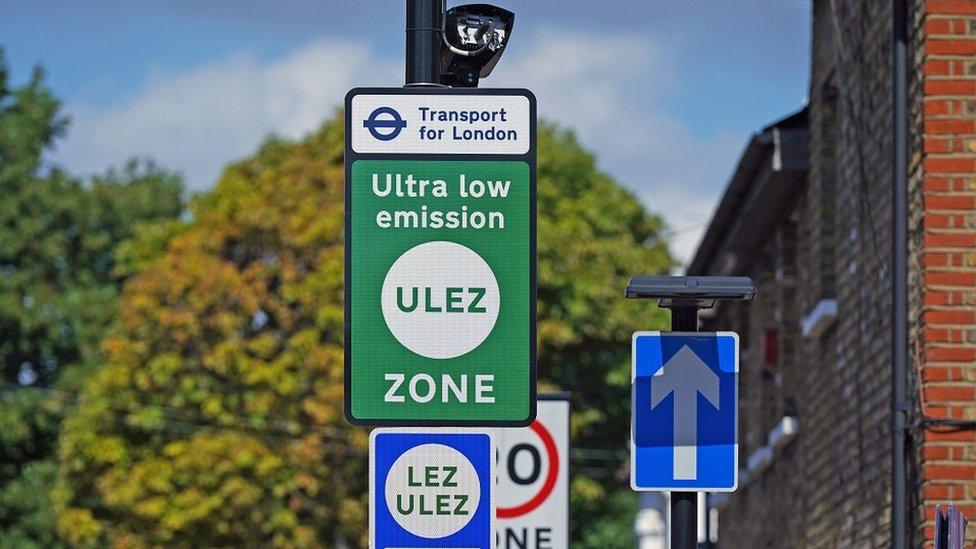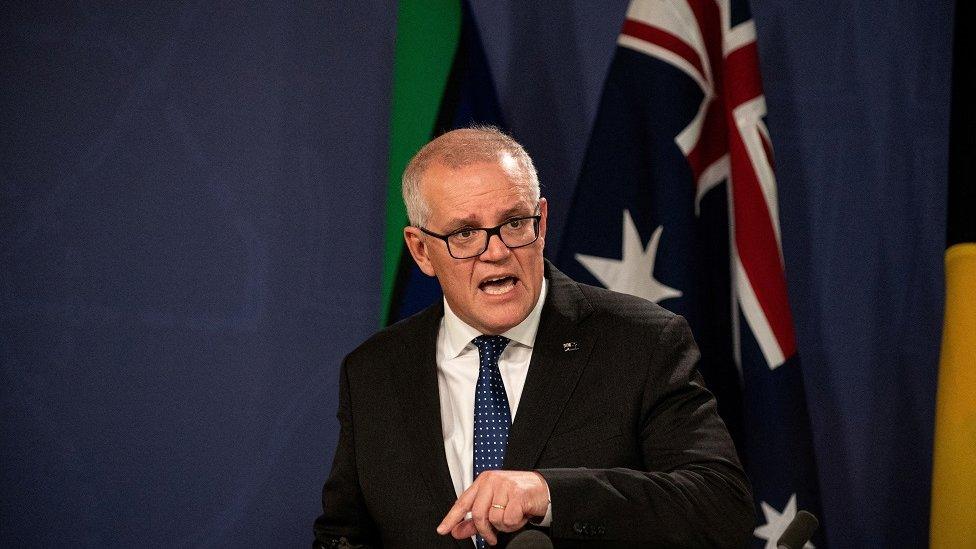Will Rishi Sunak's green rethink transform Tory fortunes?
- Published
The PM says "we have to change how we do politics" as he speaks about climate change and its impact on families.
Rishi Sunak has taken a gamble on the voting public being reluctant to make too many personal sacrifices to save the planet, after he watered down some green commitments.
He says moving too fast on green policies would "risk losing the consent of the British people".
But will the measures announced by the prime minister on Wednesday really be enough to appeal to voters and close the gap in the opinion polls on Labour?
Polling expert Sir John Curtice is not convinced.
What Mr Sunak has done, he told BBC Radio 4's Today programme, is tap into the mood among Conservative voters who tend not to like "banning things and taxing things".
But he added: "How much will any of this make a difference to the cost of living for people now, as opposed to having implications in five or 10 years time?"
Rob Ford, professor of political science at Manchester University, is even more sceptical.
"If you are 20 points behind in the polls you are going to grasp at any straw in the wind - and this is a straw in the wind," he says.
Mr Sunak appears to be basing his entire general election strategy on a single by-election result, he says, which is a an "extremely hazardous" strategy, the political equivalent of "hearing a tip in the pub about a 50-1 shot in the Grand National".
The Conservatives pulled off a surprise victory in July's Uxbridge by-election, on the back of a campaign against the expansion of London's Ultra Low Emission Zone (Ulez) - it was undoubtedly a lightbulb moment at Tory HQ.
Sources say this is what lay behind Mr Sunak's green rethink on Wednesday - to set up a "dividing line" with Labour ahead of a general election expected by some as early as next spring.
But Ulez was something that would hit some voters in the pocket right away, argues Mr Ford, unlike the green policies modified by Mr Sunak.
And although the Conservatives held on to Uxbridge by a narrow margin, their vote was down by 7.4% on 2019, which if repeated nationally would have led to a defeat for Rishi Sunak.
'Common-sense approach'
A solid majority of the British public are in favour of cutting carbon emissions to "net zero" by 2050, according to most polls.
But, says Rachel Brisley, of pollsters IPSO/Mori, they are less enthusiastic about making lifestyle changes aimed at tackling climate change. She describes this as the "say/do gap".

Has Ulez given the Tories fresh hope?
Earlier this month, IPSOS/Mori published research, external suggesting half of Britons are too worried about the cost of living to think about the impact of climate change (52%) or would like to do more to reduce climate change but say they cannot afford to (51%).
A snap poll by YouGov, external suggests that Mr Sunak's plans to delay the ban on sales of new petrol and diesel cars to 2035 have gone down very well with Conservative voters and those aged over 65.
Nearly 50% of Tory supporters strongly support it, compared with 15% of Labour voters, the survey suggests.
Mr Sunak's new approach has attracted vocal criticism from some senior figures in the Conservative party, such as Chris Skidmore and Sir Simon Clarke, but not, so far, from anyone he will be worried about.
In a letter to the PM, Conservatives Miriam Cates and Danny Kruger, who co-chair a group of Tory MPs elected since Brexit, said: "We know that new Conservative voters will welcome this announcement as a common-sense approach to the environmental challenges that we face.
"They will know that our party is on the side of working people who are trying to get on, make a living, and provide for their families."
'Champagne corks'
Conservative-supporting newspapers have also given it a warm welcome. "PM takes on eco-zealots in bold move that could transform Tory fortunes", says the Daily Mail on its front page.
Could there even be a danger that Mr Sunak has not go far enough to satisfy those voters who want to see the 2050 net zero target scrapped altogether?
Very few Tory MPs would say such a thing publicly but Reform UK - the rebadged Brexit Party - is consistently polling at around 8% and is likely to campaign hard on scrapping the 2050 target in Tory-held seats.
At the same time, Mr Sunak's apparent cooling on climate change - however passionately denied by the man himself - may harm his standing with younger middle class professionals, for whom climate change is a major concern.

Scott Morrison lost power last year in Australia
Mr Ford suggests "champagne corks will have been popping in Liberal Democrat headquarters" during Rishi Sunak's speech, as the party is going all out to unseat Tory MPs in affluent parts of the south of England.
Labour's response has been fairly muted so far, beyond saying they would restore the 2030 ban on new petrol and diesel vehicles.
Sir Keir Starmer will certainly want to tiptoe round the large, carefully-laid trap that has been set for him.
But the Labour leadership is already facing calls to go on the attack.
'Idiots or panicking'
John McTernan, a former top adviser to Sir Tony Blair, said he wanted to see Angela Rayner and other Labour figures "going on television and falling over laughing" at Mr Sunak.
He sees clear parallels between Mr Sunak and former Australian PM Scott Morrison, who led his Liberal-National government to a thumping defeat in a general election last May.
According to Mr McTernan, a former adviser to Australian Labor prime minister Julia Gillard, Mr Morrison fell flat on his face at the polls after "trying to make climate change a wedge issue".
He says it "can't be a coincidence" that Rishi Sunak's chief strategist is Aussie Isaac Levido - a former adviser to Scott Morrison, who was also credited with helping Boris Johnson to a landslide victory in 2019.
But if it was such a disastrous strategy in Australia, why are they trying to repeat it?
"My only conclusion is they are idiots or are panicking," says Mr McTernan.
"In the absence of good ideas, they are reaching for bad ideas."
And this, ultimately, is what a lot of pollsters and commentators are saying. The green policy gamble is just that - a slightly desperate punt from a party that needs to change the game.
Some, such as Rob Ford, are prepared to admit that it might just pay off.
"If you are 3-0 down in a cup final, in the dying minutes, you are going to throw on your 17-year-old wonder kid because what have you got to lose?"
We should find out in the coming days, when the first polls on voting intention at a general election are published, whether it is likely to work or not.